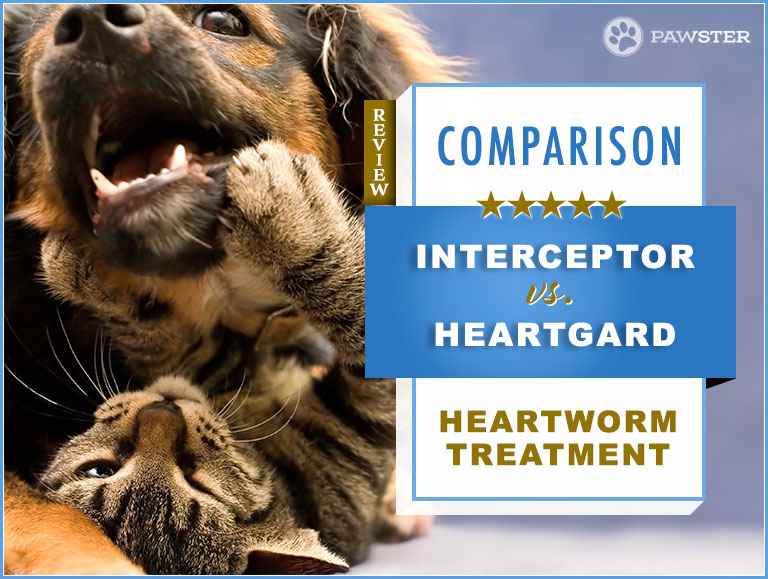Interceptor vs. Heartgard: Our 2024 In-Depth Comparison

Contents of Article
- Heartgard Key Features
- Interceptor Key Features
- What are Heartworms?
- How Do I Know If My Pet Has Heartworm?
- Are Heartworm Treatments Different for Cats & Dogs?
- Heartworm Treatment for Dogs
- Heartworm Treatment for Cats
- Which is Better Interceptor or Heartgard for Dogs?
- Which is Better Interceptor or Heartgard for Cats?
- Our Review of Interceptor and Heartgard
- Interceptor
- Heartgard
- Key Differences Between Interceptor and Heartgard
- Interceptor and Heartgard Active Ingredients Comparison
- Milbemycin Oxime & Praziquantel
- Ivermectin & Pyrantel
- Which Treatment is the Best Priced?
- Which Do We Recommend?
- 7 Treatment Application Tips
- Conclusion
Nobody likes hearing that their pet has worms, especially heartworms which are potentially fatal if left untreated.
The good news is that heartworms are entirely preventable with regular applications of heartworm medications like Interceptor and Heartgard Plus.
Heartgard Key Features
- Prevents heartworms, roundworms & hookworms
- Delivered via beef-flavored chewable tablet
- Active ingredients: Ivermectin & Pyrantel
- Not intended for feline use
Interceptor Key Features
- Prevents heartworms, roundworms, hookworms, whipworms & tapeworms
- Delivered via chicken-flavored chewable tablet
- Active ingredients: Milbemycin Oxime & Praziquantel
- Includes dose calendar reminder stickers
Heartworms are as terrible as their name implies, and vets everywhere recommend inoculating your pet from heartworms and other parasitic worms as soon as possible.
What are Heartworms?
Dirofilaria immitis, more commonly known as heartworm is a parasitic worm that, if contracted results in severe organ damage, and death in pets.
Heartworms are contracted via a bite from an infected mosquito, which inadvertently deposits heartworm larvae inside your pets’ blood steam.
The heartworm travels through the bloodstream eventually depositing itself inside the pulmonary arteries, where they can reside for up to 10 years.
Though dogs are a natural host to heartworms, cats are not immune. Heartworm disease in cats varies dramatically from heartworm disease in dogs.
Cats are referred to as atypical heartworm hosts because the feline biologic system does not support the lifecycle of a heartworm past its adolescent stage, typically 2-3 years.
Because it is less common for cats to play host to adult heartworms the parasitic disease often goes undiagnosed.
Also Read: Simparica vs. Comfortis
How Do I Know If My Pet Has Heartworm?
Unfortunately, symptoms of heartworm range from the subtle to the dramatic and are often detected too late to prevent the onslaught of organ damage or the death of the animal.
Because dogs are a natural host to heartworms they can live inside a dog for its complete lifecycle.
If left untreated the number of heartworms infesting your dog can increase into the hundreds and cause lasting damage to your dog’s heart, lungs, and arteries, and drastically reduce its quality of life.
Symptoms of heartworm disease in dogs include:
- Dry Cough – Heartworms often travel to the lungs where they multiply and crowd veins, which generally results in noticeable coughing.
- Lethargy & Uncharacteristically Low Energy Levels – Heartworm infection compromises a dog’s immune system and weakens vital body function causing fatigue, even when performing small tasks.
- Weight Loss – Heartworms can degrade a dogs quality of life to such a degree that fatigue and low lethargy bring on severe weight loss.
- Difficulty Breathing – In addition to coughing, heartworms in a dog’s lungs may result in difficulty breathing.
- Protruding Chest – It is common for a dog’s chest to fill with fluid in response to a severe heartworm infection which causes the chest to protrude significantly.
- Allergic Reactions – Dogs suffering from heartworm disease may also exhibit asthmatic, allergic reactions.
- Collapse – The final and most severe symptom of heartworm disease is collapse, which is swiftly followed by death.
Cats are atypical hosts to the heartworm, as a result; felines are rarely infected with more than three worms.
Nevertheless, even a small number of adolescent heartworms can inflict severe damage on your cat’s internal organs, and may even result in heartworm-associated respiratory disease (HARD).
Symptoms of feline heartworm disease, known as Dirofilariasis can range from the subtle to the dramatic, including:
- Asthmatic Coughing Fits
- Vomiting
- Loss of Appetite
- Weight Loss
- Difficulty Walking
- Fainting
- Seizures
- Protruding Abdomen
Since most cases of feline heartworm diseases go undiagnosed the first sign of infection is often sudden collapse and death.
Heartworms are silent, easily contracted, potentially fatal, and… highly preventable.
Heartworm can be prevented in cats and dogs with a simple monthly application of a heartworm treatment like Interceptor of Heartgard.
What’s more, heartworm prevention treatments are affordable and readily available via veterinarian prescription.
Are Heartworm Treatments Different for Cats & Dogs?
Yes. Heartworm medication and treatment intended to treat heartworm infections in dogs cannot be used in cats.
Heartworm Treatment for Dogs
Heartworm treatment for dogs will vary according to the extent of the infection.
Mild heartworm infections are typically treated with a series of injections of melarsomine, doxycycline, and prednisone to kill the heartworms, prevent future infections and reduce unwanted side effects.
In severe cases of heartworm disease, a veterinarian may prescribe surgery. Heartworm surgery is incredibly invasive and involves the surgical removal of the worms from the heart and lungs.
Heartworm Treatment for Cats
Since it is rare for felines to be infected with more than three worms, and the infecting worms rarely mature to adulthood, a vet may simply recommend monitoring the cat through the short lifespan of the worms.
Severe cases of feline heartworm disease may call for the surgical extraction of the worms from the body of the cat.
There is currently no approved adulticide therapy (a treatment that kills the presence of adult heartworms in the body) for cats.
Therefore, a surgical procedure may be needed to extract the adult worms.
The surgical procedure to extract heartworms from cats and dogs is highly invasive, traumatizing and not always successful.
The only way to truly free your pet from the ravages of heartworm disease is to prevent them from ever contracting it.
Which is Better Interceptor or Heartgard for Dogs?
Interceptor is the better heartworm prevention treatment for dogs because it also includes prevention treatment against roundworms, hookworms, whipworms, and tapeworms.
When compared to Interceptor, Heartgard lacks any protection against whipworms or tapeworms.
Which is Better Interceptor or Heartgard for Cats?
Interceptor is the better heartworm treatment option for cats when compared to Heartgard because the same treatment can be given to dogs and cats, so long as the dose is in align with their weight.
Our Review of Interceptor and Heartgard
Interceptor and Heartgard are broad-spectrum heartworm medications designed to control parasitic worms, particularly heartworm, with applications for dogs and cats.
Interceptor
Interceptor utilizes milbemycin oxime to treat and control heartworm, roundworms, hookworms, whipworms & tapeworms, and promote a healthy immune system in puppies so they can live a long and happy life.
Interceptor comes in a chicken-flavored chewable tablet that can easily be added to your pet’s food for easy consumption and a boost of flavor.
We like Interceptor because the brand makes it very easy to administer the correct dosage.
Interceptor is manufactured ins different sizes and strengths for different sized dogs and cats, and thanks to color coding the are clear and easy to understand.
- Brown Box – Interceptor Tablets for Dogs 2-10 lbs: 1 tablet every month
- Green Box – Interceptor Tablets for Dogs 11-25 lbs: 1 tablet every month
- Yellow Box – Interceptor Tablets for Dogs 26-50 lbs: 1 tablet every month
- White Box – Interceptor Tablets for Dogs 51-100 lbs: 1 tablet every month
Heartgard
Heartgard is a parasitic preventative designed to kill heartworms, roundworms & hookworms.
Administered monthly, Heartgard comes in a beef-flavored chewable tablet that is easy to conceal in your pet’s food or torn up and administered orally.
Heartgard prevents heartworm larvae from clinging to organ tissue for thirty days. When administered monthly Heartgard provides solid protection from parasites and promotes a healthy immune system.
Heartgard Plus is available in three doses, including Heartgard Chewable Tablets for Cats, up to 15 lbs.
- Blue Box – Heartgard Plus Chewable Tablets for Dogs, up to 25 lbs
- Green Box – Heartgard Plus Chewable Tablets for Dogs, 26-50 lbs
- Brown Box – Heartgard Plus Chewable Tablets for Dogs, 51-100 lbs
Key Differences Between Interceptor and Heartgard
Though both brands offer pets protection from parasitic worms, each includes a different level of protection.
Interceptor provides pets protection against heartworms, roundworms, hookworms, whipworms, and tapeworms.
Heartgard, on the other hand, does not prevent infection from whipworms or tapeworms. Interceptor and Heartgard also utilize different active ingredients.
Heartgard utilizes different combinations of ivermectin and pyrantel, whereas Interceptor utilizes a combination of milbemycin oxime and praziquantel.
Interceptor and Heartgard Active Ingredients Comparison
Interceptor and Heartgard utilize different active ingredients to achieve the same result, regular and effective protection from parasitic worms, especially heartworms.
Milbemycin Oxime & Praziquantel
Interceptor utilizes a combination of milbemycin oxime and praziquantel to rid your pet’s body of heartworms and prevent future infection.
Milbemycin oxime is used as a broad spectrum antiparasitic that is especially effective against worms and mites.
Praziquantel is used as medication designed to treat parasitic worm infections and is considered by the World Health Organization to be one of the world’s most essential medicines in any health system.
Ivermectin & Pyrantel
Ivermectin is a medication commonly used against parasites. Ivermectin increases cell membrane permeability which results in the paralysis and death of the parasite.
Pyrantel, like praziquantel, is a medication designed to treat parasitic worm infections and considered by the World Health Organization to be just as essential to the health systems of the world.
Which Treatment is the Best Priced?
Heartgard is considered more affordable than Interceptor.
Which Do We Recommend?
Interceptor and Heartgard are two very similar products that fight the common types of parasitic worms found in dogs and cats. The big difference? Interceptor provides a broader range of protection than Heartgard.
Both medications come in a meat-flavored chewable tablet that actually encourages your pet to eat it. Both medications are effective for up to 30 days and generally present few side effects.
However, Interceptor comes with a higher veterinarian recommendation and is generally considered worth the slightly higher cost.
7 Treatment Application Tips
- Heartworm treatments are not safe for use in pets less than four weeks of age and weighing less than 2 lbs.
- Before starting heartworm treatment be sure to have your pet tested for existing heartworm infections.
- If you miss a dose of heartworm treatment, simply administer the dose once you remember.
- If you miss more than one dose, consult your vet before administering another dose.
- Some pets are very picky and may refuse the treatment. For your picky pet simply break up the dose and hide it amongst their food.
- If you notice any sign of the described symptoms contact your vet as soon as it is possible.
- The effects of heartworm treatment on pregnant and nursing dogs are not yet confirmed. Be sure to consult your vet before administering a heartworm treatment to pregnant or nursing dogs.
Conclusion
It’s always a smart idea to consult your vet before starting a heartworm treatment. However, when it comes to Interceptor, you can feel safe in your choice of heartworm prevention for your pet.
Interceptor has been thoroughly tested and proven to work for up to 30 days. When administered monthly interceptor provides an impenetrable defense against roundworms, hookworms, tapeworms, whipworms and especially heartworm.






